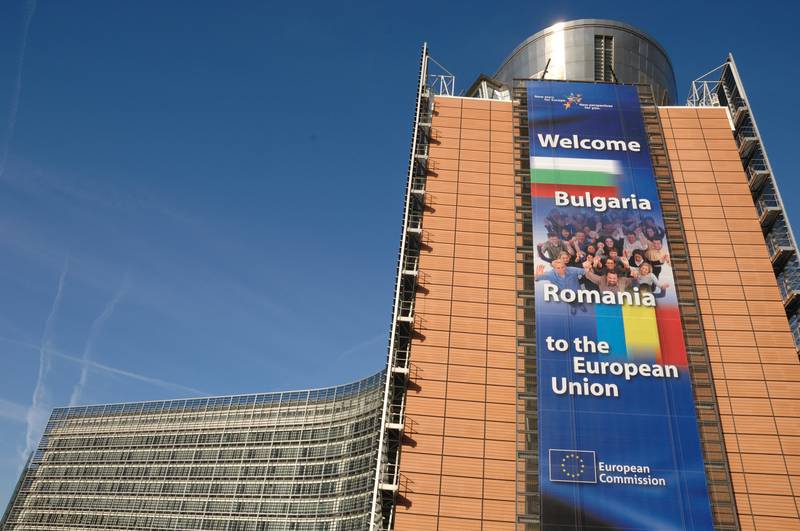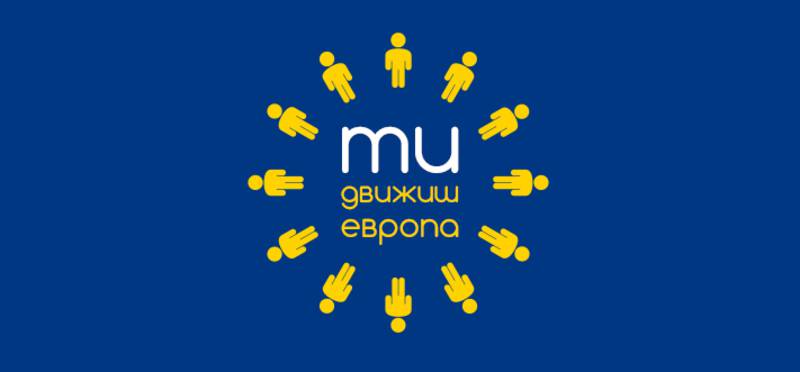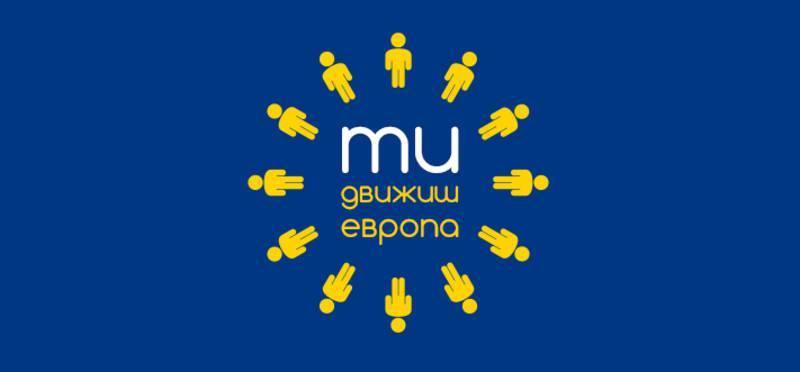Very Hard Landing for the European Integration
Adelina Marini, April 8, 2014
Where is the EU after the euro area crisis? Where is it going to? What have the dreams of the Bulgarians turned into? The EU as an economy or as politics? Bulgaria more than ever needs to make a choice. This is the shortest summary of the second debate (the first took place on March 25th) from the European agenda of the MoveBG civil platform for debate, which took place on April 3rd on the topic "What Bulgaria in what Europe?" and which euinside also took part in [the attached video is in Bulgarian language only]. The other participants were Vladimir Shopov, political analyst, Vihar Georgiev, professor in EU affairs at the Sofia University, Yavor Alexiev, economist with the Institute for Market Economy, Kuzman Iliev, co-founder of Brain Workshop Institute and the founder of this website.
The crisis in the past 5-6 years has established a process of reluctant integration provoked by the inevitability of the advanced stage of interdependency, Vladimir Shopov, a political analyst, believes. According to him, a few processes have started which will have a long-term impact. The first is that the EU and the European elites have come out of the "comfort zone" they had in the past 50 years to negotiate integration far from the eyes of their own citizens and the informed audience. Currently, the EU is much more visible and much more incorporated in the every day perceptions of people than ever and this will have fundamental consequences as for the European politics so for the policy of European integration.
The second process is politicisation of the European topic in an unprecedented way, in Vladimir Shopov's words. Practically, the party systems have endured a dramatic change and restructuring as a result of the politicisation of the European topic. The third process is an audit of membership. This reassessment is ongoing in several member states and includes a search of answers to key questions like 'how adequate is the environment in which the EU', 'which is the main process that the EU has to position itself toward' - should it be globalisation - and 'what is to come in the next ten years'. And the fourth process the political analyst outlined is the very renegotiation. "To me, personally, the opening of the treaties is not simply a selection of where to further integrate, but it will rather look like a renegotiation of the balances of power between Europe being adequate in the 21st century and how far it should to go, in which sectoral policies", Vladimir Shopov said.
According to him, there will no longer be empty integration checks and there will be no integration based upon some grandiose political vision. Vihar Georgiev, professor at the Sofia University St. Kliment Ohridsky, described the EU's present as a "reality check" and as "a very hard landing of the European integration". Currently, in the EU, there is pluralism of visions which are so many that there are multiple visions within a single party in a single member state and in Bulgaria this pluralism is still latent. It is growing harder to have a common vision about the future because, he said, if one looks at the unemployment rates in the EU they will clearly see that there is a huge gap. In the one end of the table which Vihar Georgiev demonstrated, Greece has over 27% unemployment while in the other end is Austria with a little more than 4 per cent. "This is the bottom of the bottoms and is the main reason for the divergent visions. Some people live in relative economic comfort and others are truly in a situation which socially and economically can be described as critical. There are people who live in material deprivation. They cannot afford things which even for a Bulgarian pensioner are basic. This forms a huge gap in the points of view", the professor added.
He added that so far, not even one European think-tank has made a a feasibility study of the common currency to help see where the interest of the integration process stands. If the interest is only for the elites, then this will not work, Mr Georgiev said. Another serious problem is people's identity as part of a society, their belonging.
The genesis of the European idea, Kuzman Iliev recalled, was the answer to the scariest economically harmful concepts which led to the two world wars. Europe is most of all an economic system. All state borders are artificial political formations which do not exist at economic level, he said. Europe should be a market where there is no political beginning that forcefully takes and redistributes. The ideal option for Europe would be to have common money but which is not politically controlled. Money which is measured after the golden standard. That is why, Mr Iliev underscored, the 19th century was so strong economically. Nowadays, the integration has a perverse effect because it unites in a common construction countries that have vary different economic profiles and their risk premium tends toward equalisation.
Yavor Alexiev, an economist, warned that quite often euroscepticism is mistaken for nationalism. He called on paying attention on the fact that there is a eurosceptic wing that can be called eurorealism. The euro area is a political project in its large part and the rescue of this project by monetary dimensions will lead to a drastic fall of labour costs, standard of living, of incomes by 20-30-40%. Even in France, he said, the real income will fall by 20 per cent.
Where is Bulgaria in the debate about the future of Europe?
Vladimir Shopov said that in Bulgaria can be observed the end of key processes. The first is ending up with the paradigm of automatism of the effect of accession which means the expectation that the social economic change will be realised through legal changes. The second change is the end of the consensus about the Bulgarian membership as it looked in the past 15 years. "I think that, especially in the past months, we are direct witnesses of the formulation of political strategies which are frankly anti-European and undoubtedly a process is ongoing of mainstreaming the anti-European talking, which is completely not well-grounded", Mr Shopov noted.
Bulgaria's biggest problem still is unemployment and social inequality, Vihar Georgiev emphasised and added that a clear distinction should be made between poverty and social inequality. Yavor Alexiev disagreed with this pointing out that the Eurostat data should be viewed with reserves when it comes to social inequality and poverty. According to him, it is high time Bulgaria to decide what is its interest in the EU and how much sovereignty it is ready to give away which it still does not now what to do with.
The contribution of the author of this article to the debate was that in the coming years a renegotiation of the current relations within the EU will most certainly begin and there will be further integration within the euro area which will have a significant impact on those who remain outside. Then, the gravitation forces of the EU core will be much weaker. If Bulgaria is even today some kind of a periphery, still, the fact that the country is a member of the EU brings certain advantages, including from the point of view of rating - both economic and political rating. If the euro area were to be integrated much further and deeper, the EU's gravitational forces will weaken for Bulgaria and this will have very serious political, social and economic consequences. That is why it is very important for Bulgaria to start searching the answers to the questions MoveBG raised during this debate:
- A federal Europe or a Europe of nations?
- Does the EU interfere too much in the domestic affairs of the member states or is there a wrong perception of national sovereignty?
- Do the European leaders have a common understanding and vision about the integration process?
- Is the EU actually in danger from the waves of nationalism and euroscepticism?
Not less important it is Bulgaria to answer another strategic question - should it join the euro area or not? Some ten days ago, a delegation of the economic committee of the European Parliament was on an official visit in Warsaw to check what are the moods in Poland for adopting the single currency. The members of the delegation have gathered that Warsaw is growingly inclined to accelerate the fulfilment of membership criteria because, otherwise, it risks being left out in a quite peripheral union which will be formed after the euro area turns into a genuine EU. So far, Poland has been taking advantage of the lack of a specific date for adoption of the euro in its accession treaty because it believes that this will harm its economic success - the only country that has been generating positive and stable economic growth throughout the entire period of the economic and financial crisis in the EU.
Accelerating the process of adoption of the common currency is mainly provoked not by the signs of recovery of the euro area economy but by the crisis with Russia. This, as a matter of fact, is an argument Latvia used to join the euro area on January 1st this year which was interpreted as love in the time of cholera. But to Latvia and also to Lithuania, which plans to become a eurozone member as of January 1st next year, this is a strategic choice which brings them into the core of the EU. Recently, European Commission President Jose Manuel Barroso said that the euro area is the place where a political union must be built first and that means a two-speed Europe. The current Bulgarian position, as far as it is available, is that Bulgaria should resist such a process. But how sustainable and long-term are such resisting forces and to what extent is such a position in national interest? This is a question that urgently needs an answer.
According to Yavor Alexiev, a two-speed Europe is good for Bulgaria because this is the only way to catch up with the richest member states. Purely economically, this may be so, but what I pointed out during the debate was that the European integration should be viewed in its many aspects, the most pressing of which is the geopolitical situation that emerged with the radical shift of behaviour of Russia. And when we talk about giving away national sovereignty, we should rather think what happens then with it - isn't it, actually, a process of pooling sovereignty? If we had pooled our sovereignty in terms of foreign and defence policy would we have felt so vulnerable today? If we had pooled sovereignty in terms of energy policy, would we have felt so vulnerable and dependent on Russiatoday?
Those are issues that need their answers now because eurointegration is a process which is ongoing, as Vladimir Shopov said, forcefully. And another very important thing - Bulgaria's starting position seven years after the accession is still the same - lack of a rule of law, no stable and independent institutions that could easily overcome any integration processes.
The next MoveBG debate will take place on April 16th in the MoveBG house at 1800 CET on the topic "What does Europe give us and how much Europe costs us?"
 | © European Commission
| © European Commission  | © MoveBG
| © MoveBG | © MoveBG
| © MoveBG